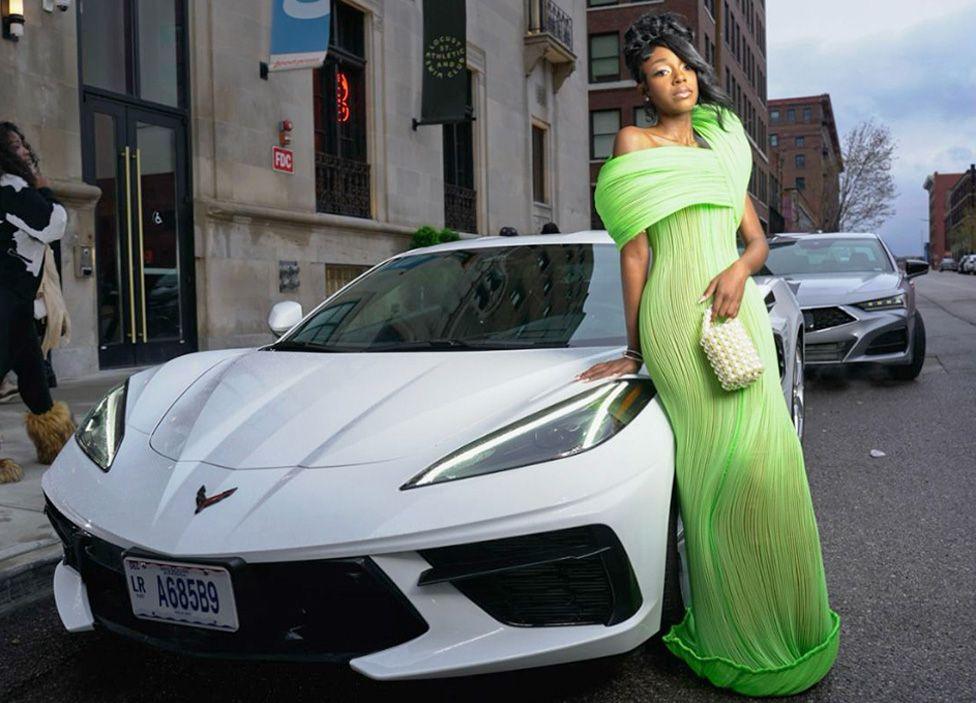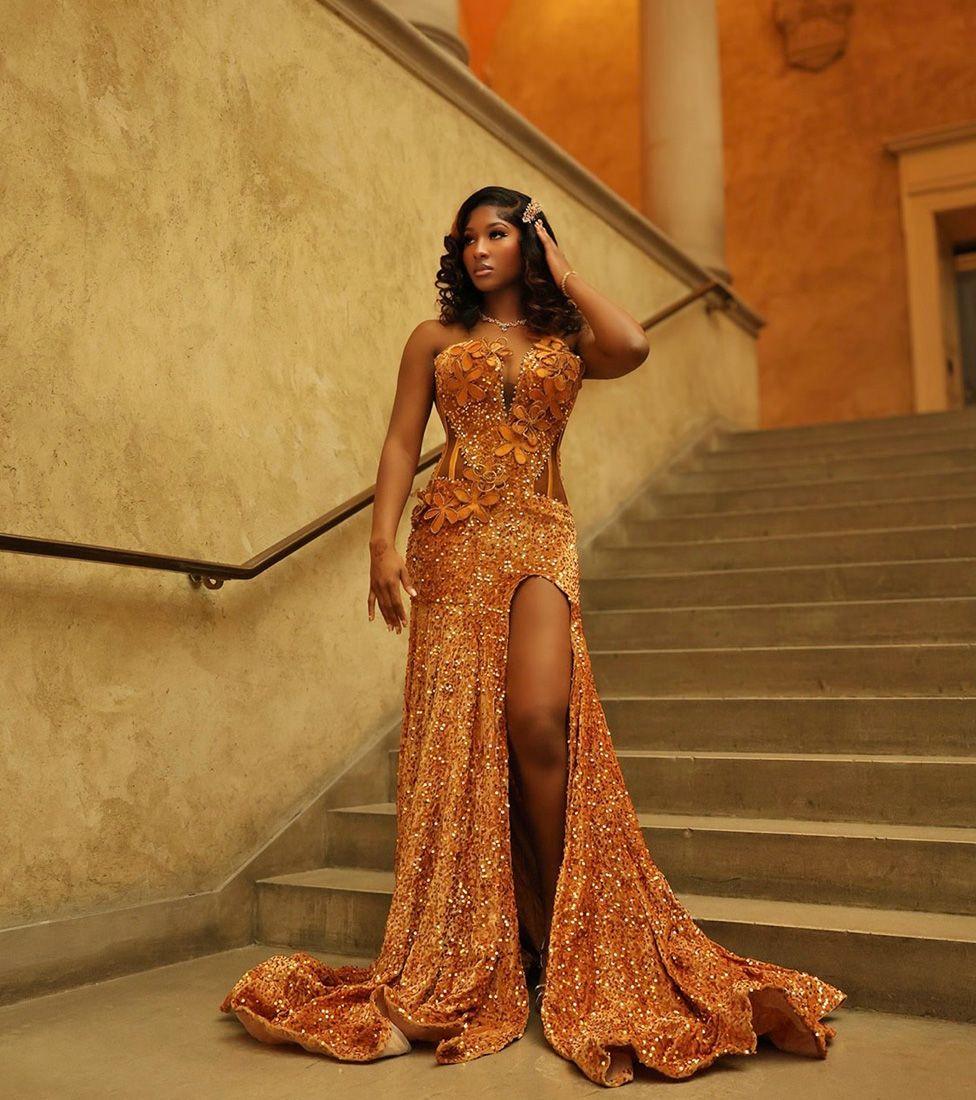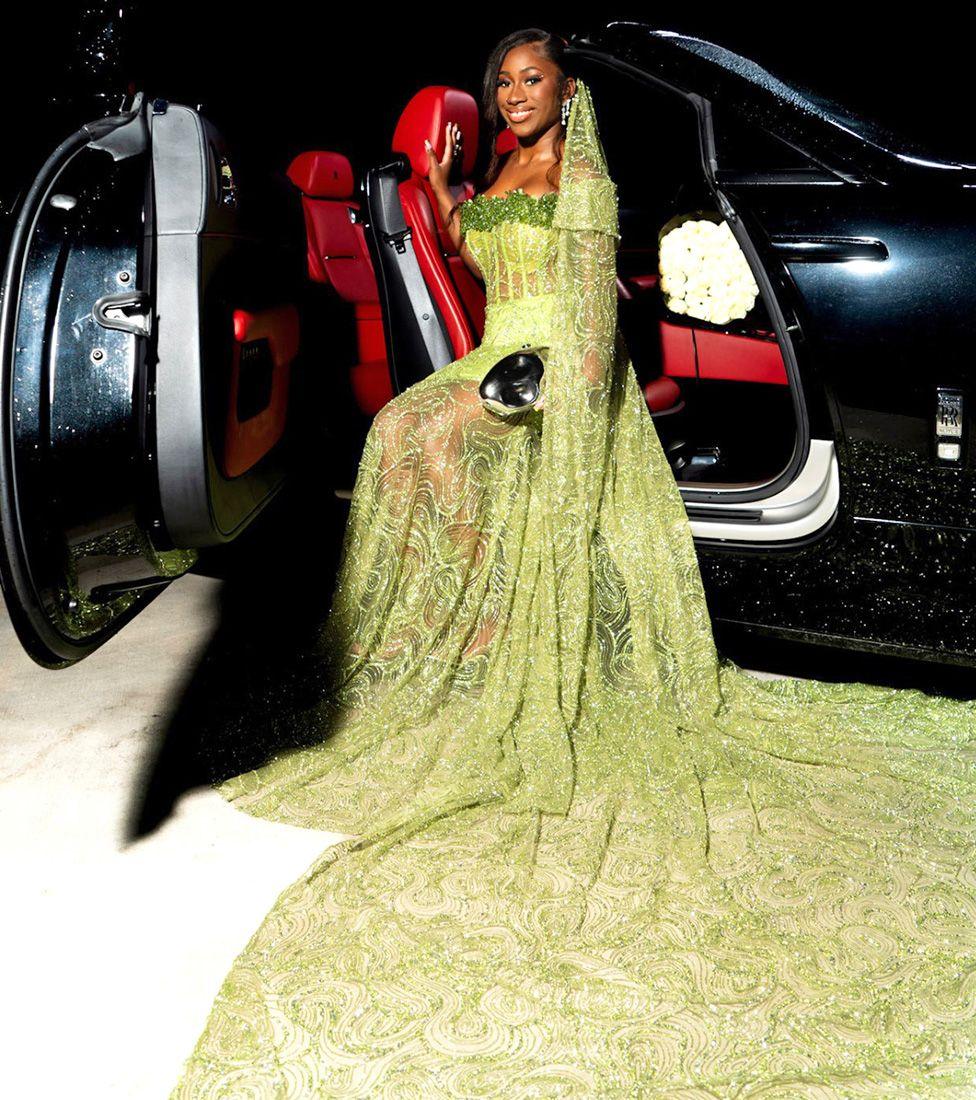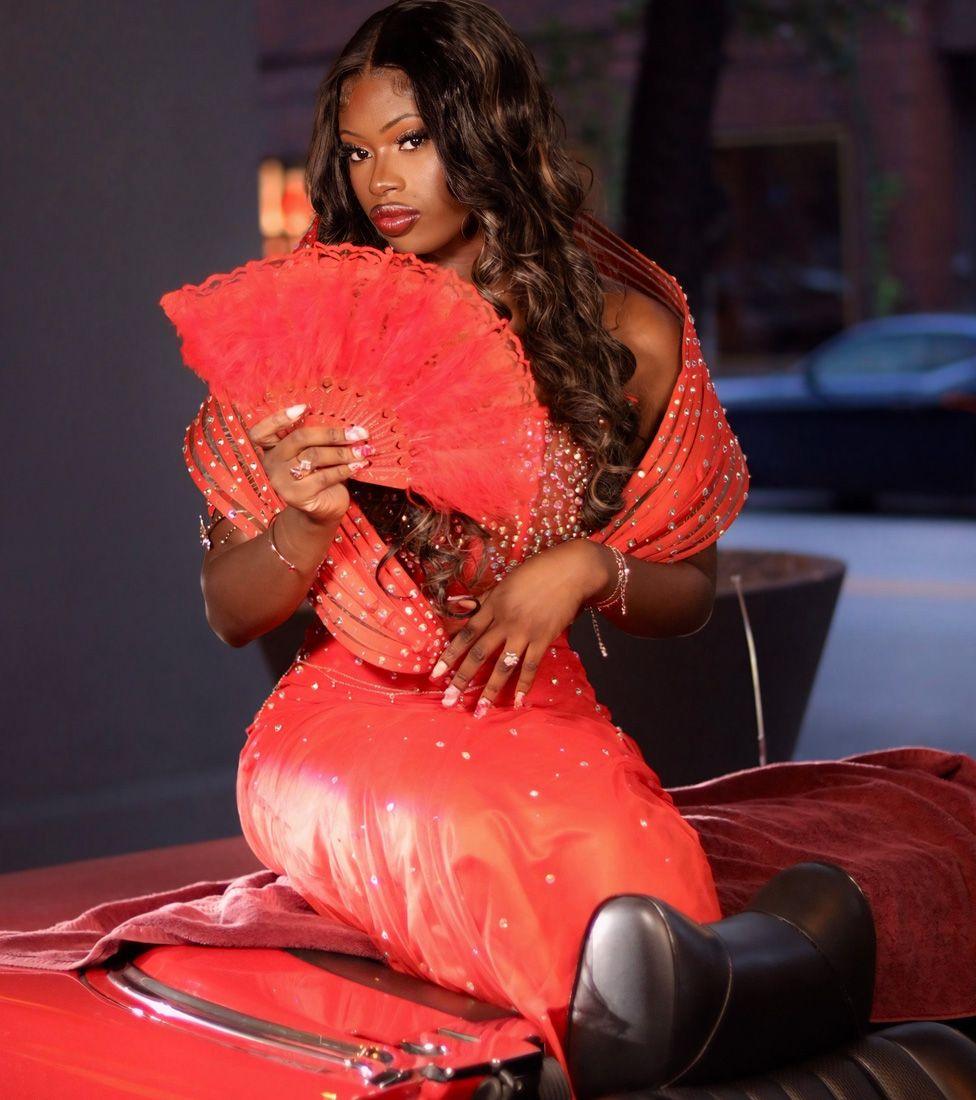The US teenagers wowed by African prom dresses

Laniyah Belcarist, from St Louis in Missouri, ordered her dress from Nigeria for this year's prom
- Published
"I felt like a princess," says US teenager Brianna LeDoux about her prom gown which she specially commissioned from Nigeria.
"I wanted my dress to stop people in their tracks."
The 18-year-old from Florida, who has Haitian and Dominican roots, wore a black garment made from a sequined and beaded, lace fabric, which is commonly used in traditional Yoruba designs for events where people want to wear matching clothes.
"I didn't just want a dress," Brianna tells the BBC.
I wanted a story I could wear - something that said: 'This is who I am, and this is where my roots run'"

"I wanted a story I could wear - something that said: 'This is who I am, and this is where my roots run.'"
High-school proms in the US are a rite of passage - long-idealised in countless coming-of-age movies - and are an opportunity for some to make a statement about identity and fashion.
The event is more than a party, it is a spectacle: part red carpet; part social milestone and for many young women - a powerful moment of self-expression.
But when Brianna made a TikTok video of herself , externalin her African prom gown, she did not expect the reaction she got - it went viral and her post now has more than 1.1 million views.
This reflects a growing interest that has driven demand for custom-made outfits with bold designs and unique embellishments.
What began as a TikTok and Instagram trend - with people like Brianna flaunting their garments - has led to a booming business that links fashion designers in Africa to young people outside the continent.
The average price for an African-made prom dress ranges from $600 to $1,000 (£440 to £740), depending on the complexity of the design, fabric choice and added details. Custom luxury pieces can exceed $1,500.
This may sound expensive but is much cheaper than having a garment custom made in the US - where the cost starts at around $3,500 and can go much higher depending on the designer and materials.
The BBC spoke to five fashion designers in Nigeria and Ghana who, in all, fulfilled more than 2,800 orders for prom dresses during the 2025 season, most of them bound for the US.
Designer Shakirat Arigbabu and her team, based in south-western Nigerian city of Ibadan, were responsible for 1,500 of those.
She has carved out a niche for herself even though the prom tradition is not popular in her country.
"Ninety-eight per cent of dresses we made went to the US. We were working in shifts, just to meet deadlines," Ms Arigbabu says.
Her business, Keerah's Fashion Cave, employs 60 full-time staff and at least 130 contract staff have been brought in during peak periods.

Anita Konneh,17, from Worcester in Massachusetts, ordered her dress from Keerah's Fashion Cave
In 2019, when she had her first major prom order, she had 50 dresses to deliver. By 2024, the orders passed 500, and this year that figure trebled.
Even though for the wearers of the gowns, post-prom may be a chance to bask in the afterglow of June's event, those making them are back at work.
Every July, Ms Arigbabu's team of tailors start preparing for next year: corset bases are cut; silhouettes are sketched; fabrics are sourced.
"It's not seasonal anymore - it's an entire cycle. Prom consumes everything," she says excitedly.
Business has also boomed for designer Victoria Ani and her workshop in Uyo, south-eastern Nigeria. She says she has shipped more than 200 gowns to New York, New Jersey and California.
She began tapping into this market in 2022 and now has a team of eight. A single gown takes three to seven days to complete, depending on the design, she says.
Ms Ani believes choosing an African designer is a cultural statement.
"They say there is this pride when they can say: 'My dress came from Nigeria,'" she says. "We had about three clients who won 'best dressed', and two who were prom queens."
Popular styles include corseted bodices, high slits, feathered trains, detachable capes and beaded sleeves. Some are inspired by Met Gala themes, Yoruba bridal looks or Afrofuturist aesthetics.
"We get requests like 'Coachella queen' or 'Cinderella but African,'" says Accra-based Ghanaian designer Efua Mensah, adding that the prom season has become a reliable sales cycle for businesses like hers.

Nian Fisher held a lengthy video call with her designer in Nigeria to make sure all the details were right
Nian Fisher, 17, from Miami in Florida, describes the experience as "unique".
She found her designer on Instagram, drawn to their 200,000-strong following and "work ethic that goes above and beyond, they don't do the bare minimum".
All arrangements were made over WhatsApp, including a live video call where a tailor in Nigeria guided her and her mum through taking measurements.
"They made sure every number was perfect so my dress would fit like a glove," she says.
When the emerald gown arrived, "everyone was amazed", Nian says.
"The veil dragged across the floor, the fabric was heavy, and people kept saying: 'Wow… a beautiful black queen.'"
Her mother, Tonya Haddly, admits she was nervous about ordering from abroad.
"But when I saw that train flowing from her head to the floor and catching the light, I knew instantly this was not made in America."
Social media has been a meeting place for US teenagers and African fashion designers who are taking advantage of the market opportunity.
When Memphis high schooler Trinity Foster, 18, went searching for a prom dress, she wanted something "rare to see" in the US and found it on TikTok from a Lagos-based designer.

Trinity Foster from Memphis says her Nigerian gown made her feel like a Disney princess
Even though she had never worn a super-formal gown before - only loose sundresses - Trinity trusted the designer's guidance, settling on a fitted look with "at least one over-the-top piece".
The two-week process was smooth, the vacuum-sealed package nerve-wracking to open, but inside was a perfectly fitting gown that made her feel like "like Tiana" on prom night - referring to Disney's first African-American princess.
"I was super excited… happy we didn't have to send it back or anything," she says.
Her Instagram post drew sweet comments, curious questions and more than a few people asking who made it.
The hashtag #AfricanPromDress now has more than 61 million views on TikTok.
"Instagram brings the sales," Ms Arigbabu says. "TikTok brings the fame."
For the Nigerian designer, most orders come through Instagram DMs, after potential clients have browsed photos of dresses tagging her brand and then get in touch.
But social media also brings complications.
Ms Arigbabu recalls a few frustrated clients who went public with their complaints instead of contacting her directly: "One girl said: 'I don't want it resolved - I want to go viral.'"
Efua Mensah, a designer in Accra, who shipped 404 dresses to the US this year, says: "Sometimes, dresses arrive late because of customs issues or courier backlog."
Sometimes, they are simply overwhelmed. "There are days we are working 20 hours fixing one gown while packaging another," she says.

Texan Grace Famoroti, 18, imported her specially designed dress from Nigeria
Still, designers say most clients are satisfied - often filming detailed unboxing videos, tagging the brand and helping to fuel visibility and a surge in orders.
African designers who spoke to the BBC said that US prom dress orders accounted for a big chunk of their annual revenue - in one case up to 25%.
With Ms Arigbabu's team in Ibadan already preparing for next year's prom season, she says for the first time she will not have to lay off temporary staff.
However, the new 15% US tariff for goods imported from Nigeria presents an immediate challenge.
"The tariff will increase the cost... making them less competitive in the US market," the designer says.
While the higher price may reduce sales, she says she is considering making small adjustments, cutting costs, improving efficiency and exploring alternative markets to stay competitive without overburdening her customers.
"Of course, I'm worried," she admits, reflecting the wider anxiety among Nigerian businesses navigating US President Donald Trump's trade policy shift.
Another big change will be that instead of operating on the old model, where each dress was crafted only after an order, she plans to transition to a ready-to-wear system, with garments being available to ship immediately.
Affordability is also a key issue - and while cheaper than buying an equivalent piece in the US, a prom dress requires significant financial resources.
As the market is growing in sophistication so are the ways to pay, with designers starting to use online payment plans to spread the cost.
Looking back, Brianna says the price tag was worth it as prom was everything she had hoped for since she was little.
"I reminisce about prom a lot - it's something girls dream about since childhood.
"Honestly, if my nails were ugly, my make-up was disgusting, and my hair wasn't cute, as long as I was in that dress, I was fine."
You may also be interested in:

Go to BBCAfrica.com, external for more news from the African continent.
Follow us on Twitter @BBCAfrica, external, on Facebook at BBC Africa, external or on Instagram at bbcafrica, external
Related topics
BBC Africa podcasts
- Attribution